Chapter 2.4 – The Pulley
The Pulley, written by George Herbert, a Welsh-born poet, orator, and priest of the Church of England, was published posthumously in 1633. The poem is both metaphysical and theological. Here, the poet examines the relationship between the Creator and creation. It helps us understand how God relates to man. He begins the poem with the story of the creation of man. He says that God provided man with everything he could yearn for in his life. His love further blessed man with strength, wisdom, beauty, honor, and pleasure, expecting man to worship him (God), who gives him everything. Perceiving that man would be overcome with greed and therefore worship nature and not the God of nature, wherein both would be losers, he (God) withheld the treasure’rest, which would pull man (creation) to God (the creator) just like a pulley lifts up a heavy object to the desired place. In other words, he makes man depend on him for survival, and man understands that without God, man is nothing. The poem ends with God having the last say because there would come a time when all the riches in the world would also not give man satisfaction, and he would be filled with emptiness. It is the restlessness (weariness) that would draw man towards God, in whom man would find everlasting peace, just like a restless, unhappy child wanting to be hugged, flinging itself into its father’s arms.
Title: The Pulley
Poet: George Herbert
Rhyme scheme:
The rhyme scheme of the poetry is ababa.
Favourite line:
My favourite line in this poem is ‘Let him be rich and weary. This brings out the contradiction of man’s nature so well. Even the wealthiest man in the world finally gets tired and experiences discontentment. This is what God planned for man.
Theme/Central idea:
The central idea of the poem revolves around God creating mankind and showering his infinite love on it in the form of various blessings and gifts. God intended to give it all but his own perception stopped Him. He visualized man to become conceited and rebellious if all the gifts were showered on him so he withheld the most precious gift of ‘rest’, so that man would give due respect to his creator. Though he had everything that money could buy, he would be restless and it would be this restlessness which would lift him towards God just like a pulley.
Figures of speech:
The poetry has many figures of speech namely Pun, Paradox, Extended Metaphor, Synecdoche, etc. adding to the flavour of the poem. The entire poem is an extended Metaphor as the feeling of anxiety has been compared to a pulley. The poem also compares rest, beauty, wisdom, honour and pleasure to the riches of this world (jewel).
Special features:
The tone of the poem is spiritual and serious. The mood of the poem is thoughtful and reflective. The poem has a good message. And the message is that however, rich we may be or whatever the abundance of qualities we may have, we must turn our thoughts to God and always thank him for the so many blessings he has endowed on us
Why I like the poem:
I like the poem because it shows the true nature of man. It teaches us to be humble and to be happy and satisfied with whatever God has endowed us with. It is also amusing that God would use a scientific invention ‘The Pulley’ to keep this creation under control and thus keep him bound to his creator.
riches : wealth bounties
dispersed : scattered
contract : collect together
span : small space
perceiving : noticing, becoming conscious of
bestow on : give as a gift to
jewel : precious valuable thing, (here) contentment (rest)
adore : love very much
repining restlessness : continuous anxiety due to dissatisfaction
weary : very tired
toss : (here) bring, throw close
Warming up!
1. Go through the following images and try to link them with our lives. For example,
Storm – Hardships that we face in our life.

Ans:
Owl – Wisdom
Rose – Life
Tree – Determination
Clouds – Sorrowful moments
Bouquet of flowers – Beauty
Waterfall – Strength
Mountains – Honour
Sunrise – Hope
2. You may have often indulged in talking to yourself audibly.
For example,
- “Oh, dear ! Why didin’t I get up sooner?”
- “Let me finish this quickly and then I’ll be free”.
- “How silly of me! Why didn’t I think of it before?”
Such expressions are called Dramatic Monologues.
Imagine and write Monologues suitable in the following situations.
It’s your birthday next week.
Ans: “Good Heavens! How time flies! It is my birthday next week and I haven’t planned anything yet.”
You have been waiting long at the city bus stop.
Ans: “Not a single bus in sight. It’s half an hour since I’ve been waiting here. Where the hell have the buses disappeared? The government has to do something about the irregularity.”
Your final exam results are to be declared tomorrow.
Ans: “Please God! God please, let me get good marks in my results tomorrow. I promise you I’ll be regular in my studies.”
Your mother has been chatting for very long on the telephone.
Ans: “Oh! Come on mother, I’m hungry. You have been on the phone for so long and you shout at me when I’m on the phone.”
3. ‘The Pulley’ is a mechanical device.
Try and write down places where it can be used, and for what purpose.
Ans:
(i) In a cargo lift system that allows items to be hoisted to higher floors.
(ii) Wells use the pulley to hoist the bucket out of the well.
(iii) Many types of exercise equipments use pulleys in order to function at the gym.
(iv) At the construction sites pulleys are used to lift and place heavy material.
(v) Modern elevators use pulleys to pull the weight of people against gravity.
(vi) Flagpoles on a sailboat or a ship uses a pulley system to hoist a flag or bring it down.
In Between The Poetry
Q1. What did God’s glass of blessings contain?
Ans: God’s glass of blessings contained all the world’s riches man could crave for.
Q2. What would the human being do if God gifted him with ‘Rest’?
Ans: If God gifted man ‘Rest’, the human being would become conceited and rebellious and would forget ‘God’.
ENGLISH WORKSHOP
1. With the help of the clues, pick out words containing the letter ‘a’ from the poem and build a word-pyramid.
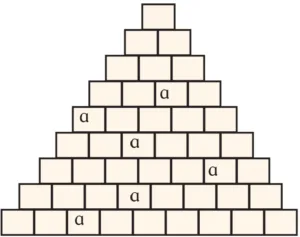
(a) an article
(b) a preposition
(c) past tense of ‘lie’
(d) maximum length of your open palm
(e) make much of
(f) loveliness
(g) in place of
(h) a collection of priceless valuables
(i) restlessness and discontent
Ans:
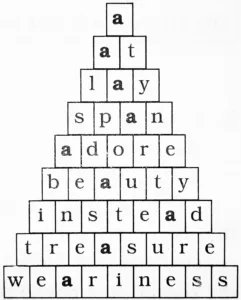
2. Choose the correct alternative from the following.
(a) Herbert’s poem ‘The Pulley’ displays ______ as the two main themes.
(i) Origin of Morality/Spirituality
(ii) Origin of species
(iii) Origin of the universe/galaxy
(iv) Origin of the earth/space
Ans: (i) Origin of Morality/Spirituality
(b) The theme of the poem ‘The Pulley’ is ______
(Find two correct statements from the given alternatives.)
(i) to focus on the mechanical operation of a pulley.
(ii) to teach a lesson to a creation (man) by the Creator (God)
(iii) to know the different gifts bestowed on man by God.
(iv) to remind man about his creator in his exhaustion.
(v) God pulled man towards Him by making him restless and weary.
Ans:
(ii) to teach a lesson to a creation (man) by the Creator (God)
(iv) to remind man about his creator in his exhaustion.
(c) In the poem, ‘The Pulley’ is considered ______
(i) a mechanical device.
(ii) a gift to mankind
(iii) an image to lift objects.
(iv) an image by which God compels people to become devout.
Ans: (iv) an image by which God compels people to become devout.
(d) ______ is an example of Pun from the poem.
(i) Rest in the bottom lay.
(ii) So strength first made a way.
(iii) Having a glass of blessings
(iv) So both should losers be
Ans: (i) Rest in the bottom lay.
(e) ______ is an example of Paradox from the poem.
(i) And rest in Nature, not the God of Nature
(ii) He would adore my gifts instead of me
(iii) Let him be rich and weary
(iv) When God at first made man
Ans: (iii) Let him be rich and weary
(f) ______ is an example of Synecdoche from the poem.
(i) So both should losers be
(ii) Then beauty flowed
(iii) “Let us” said he “pour on him”
(iv) May toss him to my breast
Ans: (iv) May toss him to my breast
(g) ______ is an example of Alliteration from the poem.
(i) Made a way
(ii) Bottom lay
(iii) Repining restlessness
(iv) Keep the rest
Ans: (iii) Repining restlessness
(h) ______ is an example of Inversion from the poem.
(i) Contract into a span
(ii) So both should losers be
(iii) Bestow this jewel
(iv) And rest in nature
Ans: (ii) So both should losers be
(i) The rhyme scheme of the poem is ______
(i) a a b b c
(ii) a b c b c
(iii) a b c c b
(iv) a b a b a
Ans: (iv) a b a b a
3. Discuss and answer in your own words, and write in your notebook.
(a) The poet has used the word REST thrice in the poem. Write what the word implies in each of the three lines it occurs.
Ans:
(i) Rest in the bottom lay: Here ‘rest’ is referred to as a treasure (which means peace and contentment).
(ii) And rest in Nature, not the God of Nature: Here ‘rest’ means appreciate and worship the things available around him in nature.
(iii) Yet let him keep the ‘rest’: Here ‘rest’ means the remaining qualities and blessings bestowed upon man.
(b) What does God want in return from man, for the gifts He has bestowed upon him?
Ans: God wants man to be grateful and worship Him, for all that has been bestowed upon him.
(c) Why did God withhold the gift of ‘Rest’ from man?
Ans: God withheld the gift of ‘Rest’ from man because he knew that if all the gifts were bestowed on man he would become greedy and conceited and forget his maker.
(d) Besides those given in the poem, what other gifts has God blessed mankind with above his other creations? Enlist them.
Ans: Besides those given in the extract, God has bestowed on mankind the ability to use language as well as other cognitive abilities like reasoning, abstract thinking, etc. Above all, He has given human beings a marvellous brain, with which man has invented millions of things, right from the wheel to the computer.
(e) When does man generally turn to God? Give one example to support your response.
Ans: Man generally turns to God in times of difficulties, trials and tribulations. Whenever we are in difficulty, it is God of whom we think first. This is not so when there is a reason for joy or entertainment.
4. (A) Discuss with your group and justify the title of the poem ‘The Pulley’ in your own words.
Ans: The Pulley is a scientific representation of man’s helplessness and reliance on God for salvation. The poem invokes a visual imagery of a heavy object being lifted up by a Pulley to the desired place. The Pulley in the poem is man’s restlessness and weariness which acts as a Pulley to reach God.
(B) Pick out 3 lines that contain Monologues of God.
Ans:
(i) Let us “pour on him all we can”.
(ii) Let the worlds’ riches, which dispersed lie.
(iii) For if I should bestow.
(iv) Let him be rich and weary.
5. (A) Pick out two lines that contain the following figures of speech.
(a) Antithesis
Ans:
1. Let the world’s riches, which dispersed lie, contract into a span.
2. Yet let him keep the rest, But keep them with repining restlessness.
(b) Alliteration
Ans:
1. When God at first made man.
2. But keep them with repining restlessness
(c) Inversion
Ans:
1. Rest in the bottom lay.
2. So both should losers be.
(B) Explain the Figures of Speech in the following lines.
(a) Rest in the bottom lay – PUN because
Ans: rest means ‘the remaining’ it also means ‘to relax, sleep or have peace of mind’.
(b) Bestow this jewel also on my creature – METAPHOR because
Ans: ‘rest’ is indirectly compared to ‘a jewel’.
(c) And rest in nature, not the God of Nature – REPETITION because
Ans: the word ‘nature’ has been repeated for better poetic effect.
6. Write Critical Appreciation of the poem in a paragraph format. (Refer to page no. 5)
Ans: The title of the poem is ‘The Pulley’. The poet is George Herbert. The central idea of the poem is the reason for man’s continual restlessness throughout his life. According to the poet, this is because God withheld the quality of rest from man so that man’s thoughts would ultimately turn towards God, his Creator. Each verse of the poem has five lines. The rhyme scheme of each verse is Ababa. The main figure of speech used in the poem is a metaphor. The ‘glass of blessings’ signifies the sum of all human qualities bestowed on man. The quality of’rest’ or ‘contentment’ is implicitly compared to a ‘jewel’. This is a poem with a message. The message states that however rich we may be, or whatever the abundance of qualities we may have, we must always turn our thoughts to God and thank Him for the many blessings He has bestowed on us. My favorite line in this poem is ‘Let him be rich and weary’. This brings out the paradox of man’s nature very well. Even the richest man in the world finally gets tired and experiences discontentment. This is what God intended for man. I like this poem because it teaches me not to be self-satisfied and content but to always remember and thank God for all the blessings He has bestowed on me.
7. ‘Pun’ can be defined as play on words based on their different meanings.
Example : ‘Writing with a broken pencil is pointless.’ In this poem there is an example of Pun. Find and make a sentence of your own. Share a joke with the class where the use of ‘Pun’ creates humour.
Ans: ‘Writing with a broken pencil is pointless.’
8. Write a paragraph on the points in each block given below to get a summary on each of the four stanzas of the poem.
I
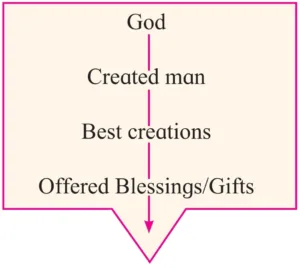
Ans: God the creator, created man, the most prized possession. He, therefore, decided to bestow all the best qualities and blessings on man.
II
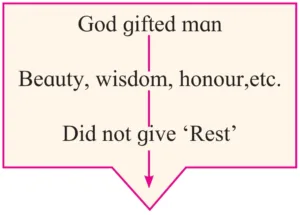
Ans: God gifted man blessings such as strength, wisdom, beauty, honour and pleasure. When only ‘rest’ remained at the bottom, God decided to withhold it from man.
III
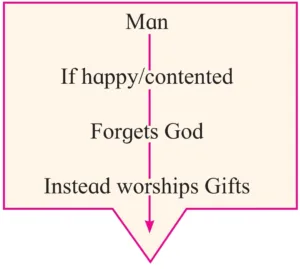
Ans: God believes that if man would get contentment and peace along with all the other blessings, man would appreciate and worship the materialistic gifts abundantly available to him and not the creator and giver, i.e. God.
IV
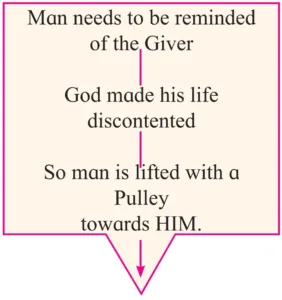
Ans: Man, therefore, needs to be weary, restless and discontented so that he is constantly reminded of his creator, God, who has given him all the other gifts. Eventually, it is this weariness and discontentment which will act as a pulley and lift man towards God.
This page will be useful if you are searching for:
The Pulley Chapter 2.4 Summary – Class 10 English Kumarbharati
The Pulley Poem Analysis – George Herbert’s Metaphysical Verse Explained
Class 10 English: ‘The Pulley’ Chapter 2.4 Summary & Appreciation
Understanding ‘The Pulley’ – A Metaphysical Poem by George Herbert
Chapter 2.4: The Pulley – Summary, Explanation & Theme Analysis
Related Search Topics:
